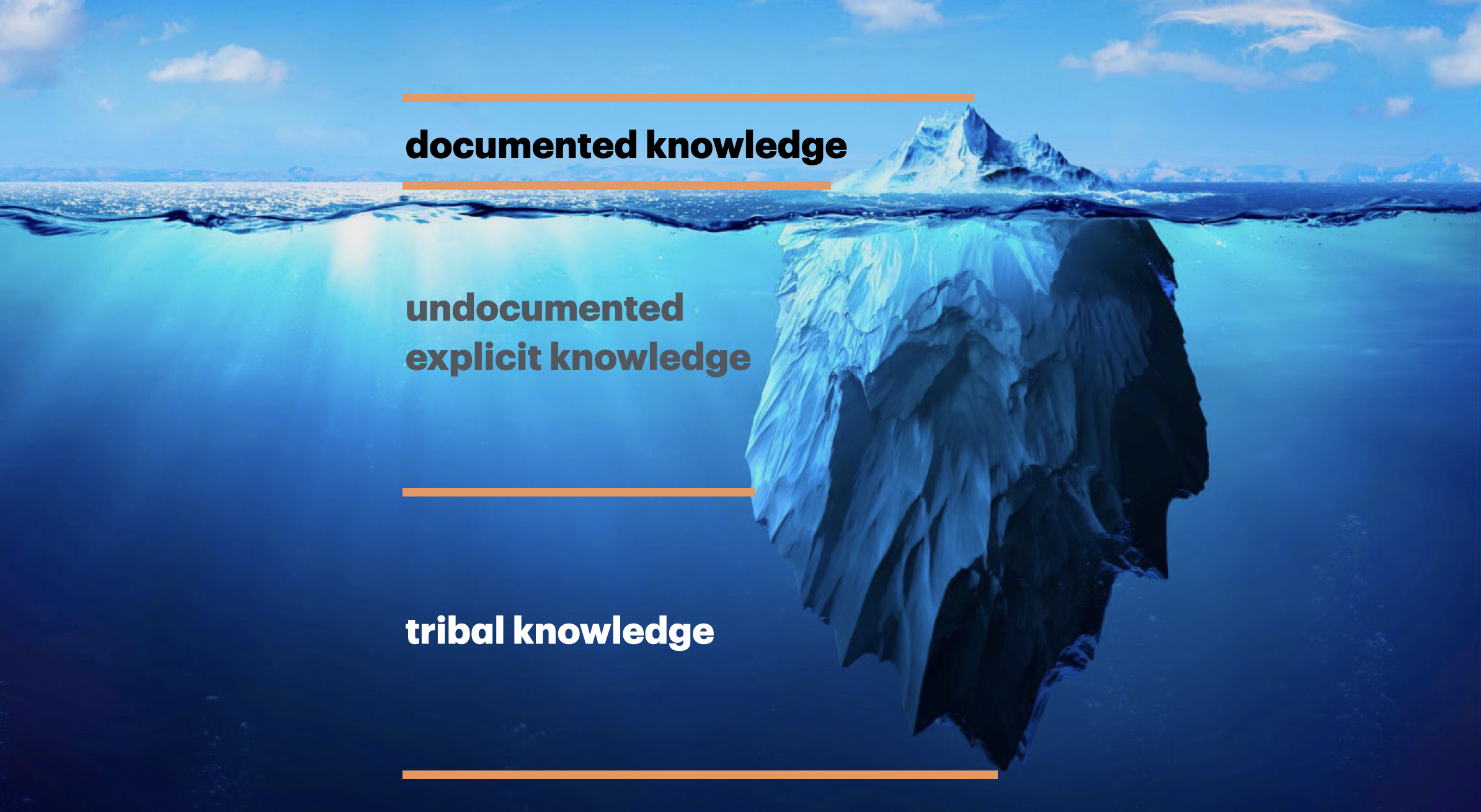What is Tribal Knowledge and Why it Matters
Every organization has a wealth of knowledge that isn’t formally documented but is deeply embedded within the minds of experienced employees. It encompasses the know-how of systems, processes, and products that are passed down informally through years of experience and interpersonal communication. This invaluable reservoir of information is often referred to as tribal knowledge.
I love this term. It clearly coveys the image of important knowledge that our cave-dwelling ancestors would have passed from one tribe member to another over generations. Although some key learnings about hunting or farming techniques could be “documented” on cave wall paintings for example– most information possessed by tribe elders would merely be shared verbally over a campfire talks between members of the tribe.
As counterintuitive as it may seem, 12,000 years later, communication in the modern day enterprise has many similarities.
The Importance of Tribal Knowledge
Tribal knowledge is crucial for several reasons:
Efficiency: This knowledge often contains shortcuts and best practices that can significantly speed up processes.
Problem-solving: It encompasses solutions to uncommon issues that may not be found in standard operating procedures.
Competitive advantage: Unique insights and methods developed over time can set a company apart from its competitors.
Continuity: It helps maintain operational consistency, especially during staff turnover.
“If HP knew what HP knows, we'd be three times more productive”
- Lew Platt, former CEO of Hewlett-Packard
The Challenge of Capturing Tribal Knowledge
While tribal knowledge can be a significant asset, it also presents challenges, particularly when it comes to transferring this knowledge and ensuring that it’s accessible to everyone who needs it. It's also notoriously difficult to capture and share. According to a study by Panopto, 42 percent of the unique knowledge that a person gains in their role would be lost if that person were to leave the company suddenly. This loss of knowledge often leads to:
Increased training time for new employees
Reduced efficiency and productivity
Potential quality issues
Lost opportunities for innovation
The same study also found that 60% of employees find it hard to get the information that they need.
SOURCE: Workplace knowledge and productivity report, Panopto
How AI Copilot Tools Can Tap into Tribal Knowledge
For organizations dealing with complex industrial products, the challenge of capturing and disseminating tribal knowledge is particularly acute. This is where an AI copilot can be an extremely effective tool.
Capturing Tribal Knowledge
AI copilots can be trained on an organization’s entire knowledge base, including both formal documentation and historical support interactions. By analyzing past support tickets, conversations, and other sources of information, AI copilots can begin to identify patterns and common solutions in non-traditional places outside a company’s documented knowledge base. Imagine two support engineers at a machinery manufacturer that chatted years ago on an internal company Slack channel about a “trick” for quickly fixing a defective oil pump issue. AI is really good at connecting the dots within unstructured data points, making relevant recommendations that would have otherwise been buried and lost forever.
Making Tribal Knowledge Accessible
Once an AI copilot has been trained, it can serve as a repository of tribal knowledge, accessible to all members of the support team. This ensures that even new or less experienced employees can tap into the collective wisdom of the organization, bridging the skills gap and allowing them to perform at a higher level more quickly.
Enhancing Efficiency and Effectiveness
By providing real-time suggestions and solutions based on both documented procedures and tribal knowledge, AI copilots enable support teams to resolve issues more efficiently. This not only reduces the time needed to solve complex problems but also ensures that solutions are consistent and aligned with best practices, regardless of the individual agent’s experience level.
Continuous Learning and Improvement
AI copilots aren’t static; they continuously learn from new interactions and feedback. This means that as the organization evolves and new tribal knowledge is created, the AI can adapt and incorporate this new information, ensuring that the support team remains effective and up-to-date.
Unlocking Tribal Knowledge as a Competitive Advantage
Tribal knowledge is a valuable asset that, when properly harnessed, can significantly enhance an organization's performance, particularly in technical support roles. By leveraging AI-powered copilot tools, companies can bridge the gap between experienced and newer staff, preserve crucial institutional knowledge, and ultimately provide better, more efficient support to their customers.
With the paradigm shift that AI has ushered in, the ability to effectively capture and utilize tribal knowledge will become a key differentiator for businesses, especially those dealing with complex products and systems. Embracing tools that facilitate this process isn't just about improving current operations– it's about future-proofing your organization's knowledge base and maintaining a competitive edge in an increasingly complex business landscape.
❖ ❖ ❖
Contact our team today to learn how AI-powered technical support tools can be deployed in your business!



